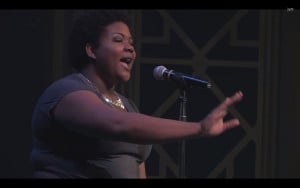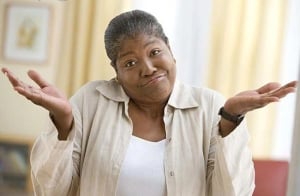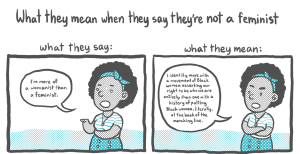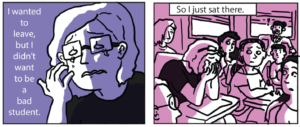STEPHEN COLBERT: So I speak for all gamers when I say the media should stop talking to critics like Anita Sarkeesian. Here now to be talked to is media critic and creator of the web series Feminist Frequency, Anita Sarkeesian.
Ms. Sarkeesian, thanks so much for being here. Alright, look. Let’s put this on the line. Let’s call this what it is: you and the other feminazis in the gamer world are coming for our balls to snip them off, put them into a little felt purse, and take them away so we have to play your non-violent games, right?
ANITA SARKEESIAN: No, that’s not true.
STEPHEN: It’s a culture war! It’s a subculture war!
ANITA: There is something going on and what it is, is women being harassed, and threatened, and terrorized—
STEPHEN: After you first attached male gamers for enjoying looking at big-breasted women with tiny armor that barely covers their nipples! What is wrong with that? I like what that looks like! I’m a man, baby!
ANITA: Great.
STEPHEN: News flash! I like it!
ANITA: Well, one of the problems with that is that it actually reinforces this cultural myth that women are sexual objects and sexual playthings for male amusement. And we’re not.
STEPHEN: We’re saving them! They’re damsels in distress. I’m saving the princess! Am I supposed to let the princess die? Is that what you want? That’s kinda harsh. That’s kinda hostile.
ANITA: Well, maybe the princess shouldn’t be a damsel. Then she could save herself.
(CROWD cheers)
STEPHEN: Well, they’ve got games where—They’ve got games…I didn’t know you brought a posse.
ANITA: I’m well liked. Sometimes.
STEPHEN: Alright, so, you’ve been the object of criticism yourself.
ANITA: Yes.
STEPHEN: What happened at Utah State University?
ANITA: There was a threat that someone emailed to the school saying that they would commit the biggest school shooting—a massacre—if I was allowed to speak.
STEPHEN: But by criticizing these—would you call them male fantasy games?
ANITA: Some of them.
STEPHEN: Or male fantasy objectification of women games?
ANITA: Some of them, that would be an accurate title, yeah.
STEPHEN: Okay, some of them. Give me some names. Name some names.
ANITA: So, in the work that I do, I look at hundreds of examples of video games—
STEPHEN: So can you think of three? Can you think of three?
ANITA: I can. But I think it’s a bigger issue to talk about the industry as a whole and how it perpetuates these ideas of sexism and misogyny, as opposed to just Grand Theft Auto, for example.
STEPHEN: Okay, why do you think that women are being threatened? Because it’s almost entirely women who are being threatened in Gamergate. Chris Kluwe has talked about this, he hasn’t been threatened. Other men haven’t been threatened. Why do you think women are being threatened in this exchange?
ANITA: I think women are perceived as threatening because we are asking for games to be more inclusive. We’re asking for games to acknowledge that we exist and that we love games.
STEPHEN: Why not just have a separate game? Have separate, but equal games.
(CROWD laughs)
ANITA: Well, we do have lots of different kinds of games, and—
STEPHEN: So what are you complaining about?
ANITA: And that’s one of things that I think is happening here is that we have this wide range of games. We’re seeing mobile games, we’re seeing indie games, we’re seeing this influx of different kinds of games, and that’s what Gamergate is responding to. They’re actually responding to the fact that we’re saying gaming can no longer be this little boys’ club anymore. That there are many of us who have been playing games their whole lives—many of us women who’ve been playing these games our whole lives. And so they’re lashing out because we’re challenging the status quo of gaming as a male-dominated space.
(CROWD applauds and cheers)
STEPHEN: Do you hear the applause for a male-dominated space?
(CROWD laughs)
STEPHEN: What about the accusations of collusion between designers, feminists, and journalists? Do you understand how important it is? We are talking about ethics in gamer journalism. Do you understand how huge that is? I mean, what if there were no ethics in Hollywood journalism?
(CROWD laughs)
STEPHEN: If we can’t trust Entertainment Tonight or TMZ, where would we be? Is that what you want for gamer journalism?
ANITA: I think that that is a sort of compelling way to reframe the fact that this is actually attacks on women. Ethics in journalism is not what’s happening, in any way. It’s actually men going after women in really hostile, aggressive ways. That’s what Gamergate is about. It’s about terrorizing women for being involved in this industry, for being involved in this hobby.
STEPHEN: It’s a little bit off subject, but I have something. As a man, am I allowed to be a feminist?
ANITA: Do you believe that women should have equal rights to men—
STEPHEN: Sure.
ANITA: And that we should fight for those rights?
STEPHEN: Sure.
ANITA: Great, then you’re a feminist.
(CROWD applauds and cheers)
STEPHEN: Anita Sarkeesian, Feminist Frequency. We’ll be right back!




















